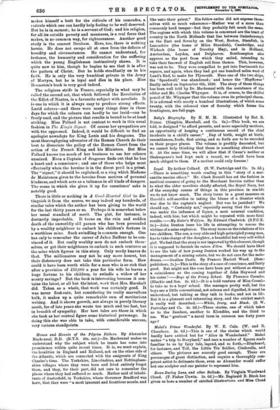Loyal. By Arthur Collard. (S. W. Partridge and Co. 2s.
6d.) —There is something worth reading in this " story of a mer- cantile marine officer." Mr. Clark Russell has set the fashion in nautical romance of going to the Merchant Service rather than to what the older novelists chiefly affected, the Royal Navy, but of the everyday course of things in this province in sea-life we do not know much. The story turns in a great measure on Harold's self-sacrifice in taking the blame of a disaister which was due to the captain's neglect. But was he justified ? We should say, " Certainly not," especially seeing that the captain was under the influence of liquor, a most unusual condition, indeed, with him, but which might be repeated with more fatal results.—My Sister's Welfare. By Edward Chadwick. (S.P.C.K. 2s.)—John Denton loses his life in attempting to rescue the victims of a mine explosion. The story turns on the relations of his two children. The son, a very able and high-principled young man, has to take charge of the daughter, a beautiful but very self-willed girl. We feel that the story is not improved by this element, though it is supposed to furnish its raison. d'être. We should have liked to see the tale of how young Denton worked his way up to the management of a mining estate, but we do not care for the melo- drama.—Swallow Castle. By Frances Hariott Wood. (Same publisher.. 2s.)—This is the story of a case of conscience, and fairly good. But might not the case have been put witheut so strange a coincidence as the coming together of John Heywood and his sister:'—Boys of the Priory School. By Florence Coombe. (Blackie and Son. 2s. 6d.)—It is a bold venture of Miss Coombe to take us to a boys' school. She manages pretty well, but the boys are a little conventional, not solemn and dignified, it must be understood, but talking as they talk in books, and not in life. But it is a pleasant and interesting story, and the cricket match is really well described.—White, Ivory, and Black. (S. W. Partridge and Co. 3s. 6d.)—Three stories, one of which takes us to the Zambesi, another to Klondike, and the third to sea. Was " gunboat" a naval term in common use forty years ago ?






















































 Previous page
Previous page